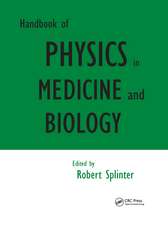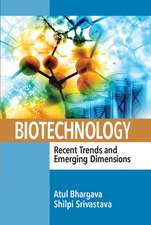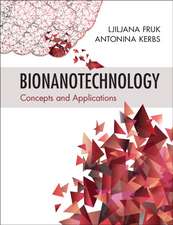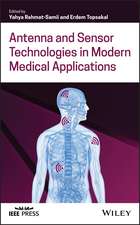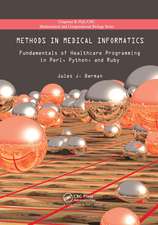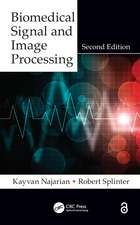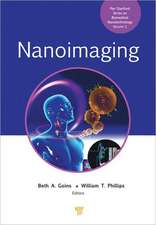An Introduction to Biomedical Optics: Series in Optics and Optoelectronics
Autor Robert Splinter, Brett A. Hooperen Limba Engleză Hardback – 13 dec 2006
The textbook is divided into three main sections: general optics theory, therapeutic applications of light, and diagnostic optical methods. Each chapter has different levels of detail to build students' knowledge from one level to the next. The first section covers the history of optics theory and the basic science behind light-tissue interactions. It also introduces the relevant approaches and approximations used to describe light propagation in turbid biological media. In the second section, the authors look more closely at light-tissue interactions and their applications in different medical areas, such as wound healing and tissue welding. The final section examines the various diagnostic methods that are employed using optical techniques. Throughout the text, the authors employ numerical examples of clinical and research requirements.
Fulfilling the need for a concise biomedical optics textbook, An Introduction to Biomedical Optics addresses the theory and applications of this growing field.
Din seria Series in Optics and Optoelectronics
-
 Preț: 363.44 lei
Preț: 363.44 lei -
 Preț: 360.62 lei
Preț: 360.62 lei - 18%
 Preț: 1067.35 lei
Preț: 1067.35 lei - 9%
 Preț: 1249.37 lei
Preț: 1249.37 lei -
 Preț: 364.88 lei
Preț: 364.88 lei - 18%
 Preț: 1272.54 lei
Preț: 1272.54 lei - 18%
 Preț: 1391.72 lei
Preț: 1391.72 lei - 23%
 Preț: 427.84 lei
Preț: 427.84 lei - 12%
 Preț: 312.43 lei
Preț: 312.43 lei - 25%
 Preț: 999.98 lei
Preț: 999.98 lei - 27%
 Preț: 888.62 lei
Preț: 888.62 lei - 9%
 Preț: 335.20 lei
Preț: 335.20 lei - 18%
 Preț: 1277.45 lei
Preț: 1277.45 lei - 15%
 Preț: 489.26 lei
Preț: 489.26 lei - 18%
 Preț: 1938.64 lei
Preț: 1938.64 lei -
 Preț: 469.29 lei
Preț: 469.29 lei -
 Preț: 430.43 lei
Preț: 430.43 lei - 27%
 Preț: 1212.67 lei
Preț: 1212.67 lei -
 Preț: 453.88 lei
Preț: 453.88 lei - 29%
 Preț: 1355.27 lei
Preț: 1355.27 lei - 16%
 Preț: 312.43 lei
Preț: 312.43 lei - 18%
 Preț: 1811.96 lei
Preț: 1811.96 lei - 28%
 Preț: 988.95 lei
Preț: 988.95 lei - 28%
 Preț: 987.33 lei
Preț: 987.33 lei - 9%
 Preț: 336.42 lei
Preț: 336.42 lei -
 Preț: 433.30 lei
Preț: 433.30 lei - 18%
 Preț: 1000.27 lei
Preț: 1000.27 lei - 18%
 Preț: 273.89 lei
Preț: 273.89 lei -
 Preț: 434.63 lei
Preț: 434.63 lei -
 Preț: 469.29 lei
Preț: 469.29 lei - 28%
 Preț: 992.94 lei
Preț: 992.94 lei - 9%
 Preț: 976.01 lei
Preț: 976.01 lei - 12%
 Preț: 312.43 lei
Preț: 312.43 lei -
 Preț: 440.61 lei
Preț: 440.61 lei -
 Preț: 430.80 lei
Preț: 430.80 lei - 18%
 Preț: 3170.19 lei
Preț: 3170.19 lei - 20%
 Preț: 948.28 lei
Preț: 948.28 lei -
 Preț: 431.35 lei
Preț: 431.35 lei - 14%
 Preț: 315.37 lei
Preț: 315.37 lei
Preț: 812.95 lei
Preț vechi: 991.41 lei
-18% Nou
Puncte Express: 1219
Preț estimativ în valută:
155.56€ • 166.35$ • 129.70£
155.56€ • 166.35$ • 129.70£
Carte tipărită la comandă
Livrare economică 17 aprilie-01 mai
Preluare comenzi: 021 569.72.76
Specificații
ISBN-13: 9780750309387
ISBN-10: 0750309385
Pagini: 624
Ilustrații: 30 b/w images
Dimensiuni: 156 x 234 x 38 mm
Greutate: 1.33 kg
Ediția:1
Editura: CRC Press
Colecția CRC Press
Seria Series in Optics and Optoelectronics
ISBN-10: 0750309385
Pagini: 624
Ilustrații: 30 b/w images
Dimensiuni: 156 x 234 x 38 mm
Greutate: 1.33 kg
Ediția:1
Editura: CRC Press
Colecția CRC Press
Seria Series in Optics and Optoelectronics
Public țintă
UndergraduateCuprins
Introduction to the Use of Light for Diagnostic and Therapeutic Modalities. Review of Optical Principles: Fundamental Electromagnetic Theory and Description of Light Sources. Review of Optical Principles: Classical Optics. Review of Optical Interaction Properties. Light-Tissue Interaction Variables. Light-Tissue Interaction Theory. Numerical and Deterministic Methods in Light-Tissue Interaction Theory. Light-Tissue Interaction Mechanisms and Applications: Photophysical. Light-Tissue Interaction Mechanisms and Applications: Photochemical. Light-Tissue Interaction Mechanisms and Applications: Photobiological. Therapeutic Applications of Light: Photophysical. Therapeutic Applications of Light: Photochemical. Therapeutic Applications of Light: Photobiological. Diagnostic Methods Using Light: Photophysical. Diagnostic Methods Using Light: Photochemical. Diagnostic Methods Using Light: Photobiological.
Recenzii
"An outstanding feature of the book is its carefully designed structure which makes it abundantly clear where required material is located . . . one should commend the high standard of production of the book; it is well laid out . . . Overall it is considered that acquisition of this book will be an excellent investment for anyone who wishes to gain an appreciation of the principles and applications of biomedical optics."
– Professor K. A. Shore, University of Wales, in Contemporary Physics, November 2007
– Professor K. A. Shore, University of Wales, in Contemporary Physics, November 2007
Notă biografică
Robert Splinter, Brett A. Hooper
Descriere
This is the first comprehensive, introductory book describing both diagnostic and therapeutic optical methods in medicine. The first section covers the history of optics theory and the basic science behind light-tissue interactions. It also introduces the relevant approaches and approximations used to describe light propagation in turbid biological media. In the second section, the authors look more closely at light-tissue interactions and their applications in different medical areas, such as wound healing and tissue welding. The final section examines the various diagnostic methods that are employed using optical techniques. Throughout, the text employs numerical examples of clinical and research requirements.


